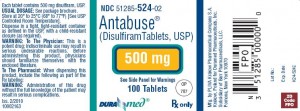Disulfiram Use
Disulfiram Use
Disulfiram is a drug that has been used since the 1940’s for the treatment of alcoholism. It’s also known by its brand name “Antabuse.” Basically, disulfiram use blocks the processing of alcohol in the body, causing unpleasant effects. It’s meant to condition a person to associate drinking with negative side effects.
Disulfiram use was originally meant to treat parasitic infections. Its effect when alcohol is consumed was discovered by accident. Users who took it, then drank alcohol, reported some very nasty side effects. Since that point, disulfiram has been used to treat chronic alcoholism.
Disulfiram use causes flushing of the face, headache, nausea, vomiting, chest pain, weakness, blurred vision, mental confusion, sweating, choking, breathing difficulty and anxiety when alcohol is consumed. These reactions start about ten minutes after consuming alcohol and can last for up to an hour. When someone takes disulfiram, they need to wait at least twelve hours after their last drink. They also must wait up to two weeks after they discontinue disulfiram use to have a drink without experiencing the unpleasant side effects.
Disulfiram use works by blocking the breakdown of alcohol in the body. Alcohol is broken down in the liver first to acetaldehyde, then to harmless acetic acid. Disulfiram use blocks this second breakdown which causes a buildup of acetaldehyde in the body. Acetaldehyde is the main chemical that is responsible for the symptoms of a hangover. The person then experiences extreme hangover symptoms almost immediately. This is thought to discourage alcohol abuse in the long run.
Experts recommend that you should always combine disulfiram use with counseling for the treatment of alcoholism. The problem with disulfiram use alone is that it depends on patient compliance. Alcoholics who are being treated with disulfiram must make the decision to take the pill on a daily basis. It goes without saying that the number of alcoholics who actually take the pill as prescribed is very low. Additionally, disulfiram use has absolutely no effect on alcohol craving.
This is why counseling should always be part of the treatment plan. Some studies have reported that there is no better outcomes in patients who have been treated with disulfiram and counseling than with counseling alone. The main reason is that there is such poor patient compliance with disulfiram use. To try to improve compliance, manufacturers have developed a sub dermal disulfiram implant. This device is implanted under the skin and releases a continuous stream of the drug.
Disulfiram use is also being explored for the treatment of cocaine addiction. Apparently, it prevents the breakdown of dopamine, one of the neurochemicals that is released when cocaine is used. The buildup of dopamine causes increased anxiety, higher blood pressure, restlessness, and other unpleasant symptoms.
In the absence of alcohol, the most common side effects of disulfiram use are headache, drowsiness, and a metallic taste in the mouth. People do not develop tolerance to disulfiram use. In fact, the longer it is taken, the stronger its effects. Medical ethics dictate that patients must be fully informed about the effects of disulfiram use and alcohol and that the drug should never be given to someone without their knowledge.
http://www.ncbi.nlm.nih.gov/pubmedhealth/PMH0000726/
http://en.wikipedia.org/wiki/Disulfiram
http://www.nlm.nih.gov/medlineplus/druginfo/meds/a682602.html
